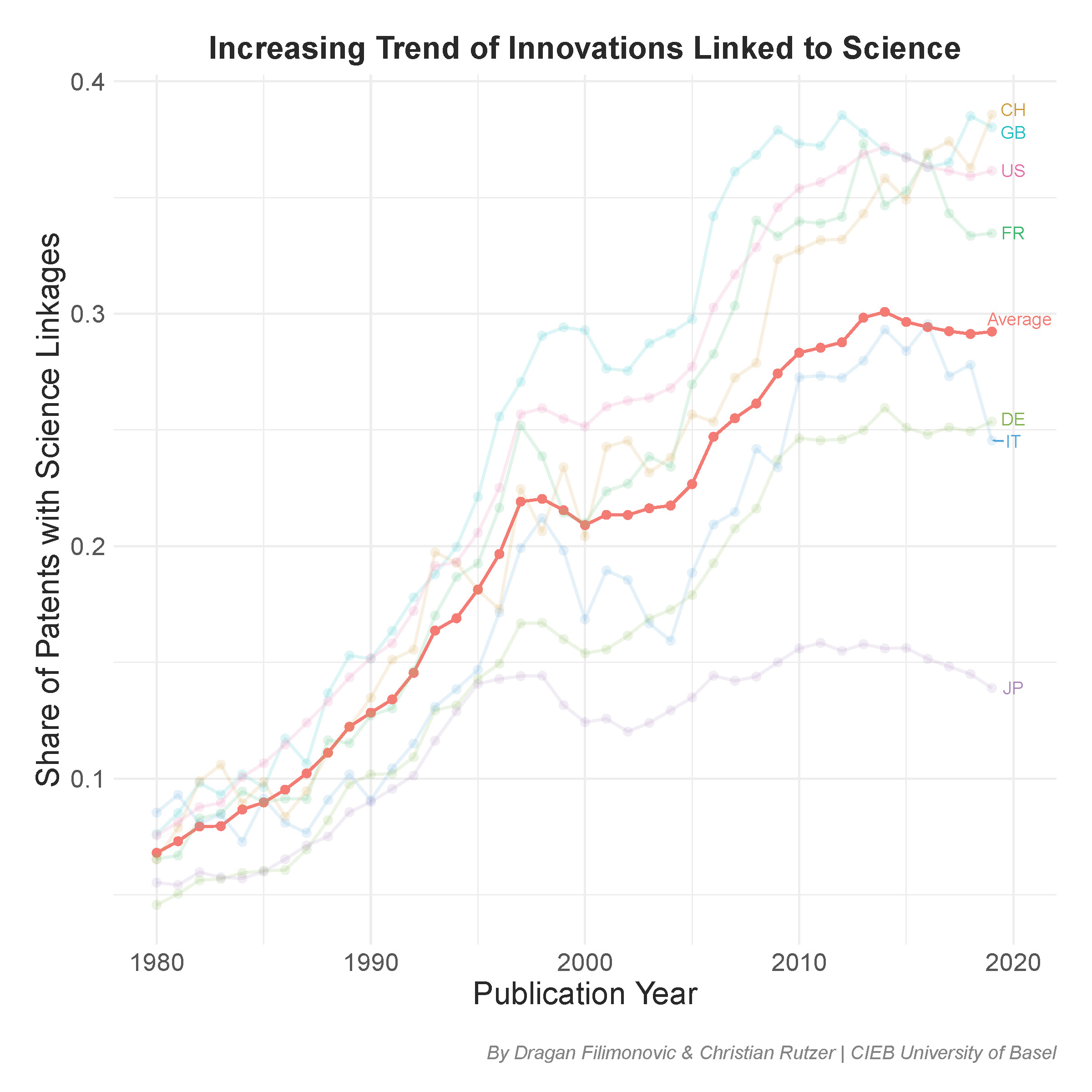The proportion of new patents that rely on scientific breakthroughs is increasing, showing the importance of funding for basic research

University of Basel’s Faculty of Business and Economics. Photo credits: University of Basel
Basic scientific research is increasingly driving innovation, according to new analysis from the University of Basel’s Centre for International Economics and Business.
The Swiss researchers crunched the numbers for patents granted by the US Patent and Trademark Office over the last 40 years, finding that approximately 30% of those granted in the last decade cited at least one scientific paper, compared to around 7% in the early 1980s. This points to a higher degree of knowledge transfer, they say.
The research was motivated by ongoing debates about the value of public funding of science in Switzerland, said Christian Rutzer, deputy head of the University of Basel. In March, the federal government reduced the budget for education, research and innovation by CHF500 million (€516 million) for 2025-28. Many other countries, including France and the Netherlands, are also facing cuts to public funding.
“Okay, you can freeride on the global public good of science. But we show it’s not about the science domain alone, it spills over into innovation. You need a great science space to get a great innovation space,” Rutzer told Science|Business. But too often, politicians see research only as a cost, he said.
He offers two possible explanations for the increasing number of patents citing scientific papers. “On the one hand, it might be harder to find new ideas for innovation, so you have to rely more on science to get ideas,” he said. “It may also be the case that science offers you much more than in the past.”

Among the countries studied, Switzerland had the highest proportion of science-based patents, possibly due to its strong life sciences sector, followed by the UK and the US.
Rutzer published the analysis in a series of five LinkedIn posts on the importance of science for innovation. In the second, he and his team concluded that patents closely linked to scientific research are more likely to be high-impact innovations, which they define as the world’s top 10% most cited patents in a given year and a given technology.
With approximately 15% of science-based patents falling into this category, compared to under 9% for other patents, they argue that science plays a key role in generating innovations that impact society.
The third instalment breaks the data down by industry, and shows that this trend is particularly noticeable in engineering fields. “This suggests that integrating basic research in these fields could yield significant benefits. In contrast, fields like chemicals and pharmaceuticals already heavily rely on science for innovation, resulting in a smaller differential benefit,” the researchers say.
Science-linked patents are also shown to have a higher impact in the US than in other parts of the world, which the Basel team attributes to the strong ties between US universities and industry, and the culture of entrepreneurship which helps to attract top talent from around the world.
It is notoriously difficult to measure the impact of science on innovation and new technologies. That question is at the heart of debates around the next EU research programme, Framework Programme 10. There have been calls for a more strategic approach to innovation, focusing on key technologies for European competitiveness, but scientists point to examples such as mRNA vaccines to show the importance of basic research in driving future innovation.
The new analysis follows previous research from German economists Martin Watzinger and Monika Schnitzer, which found that patents building directly on science are on average $2.9 million more valuable than patents in the same field that are unconnected to science.
The increase in science-based patents is not surprising, says William Burns, a consultant in science and research policy at Science Think Tank. “We had enormous numbers of policies for at least 40 years driving the uptake of recent science into innovation, like the ‘entrepreneurial university’,” he told Science|Business.
While science is important for innovation, the role of recent breakthroughs should not be overstated, Burns said. “Innovation does not seem to rely entirely on recent science. It relies on old science, trial and error, luck, false premises, guesses, genius and many other unspecified processes […] In the end, no one really understands innovation, all we can do is try various policy ideas and see if they help.”
The University of Basel decided to condense its findings so far in the hope of reaching a wider audience from the business and policy worlds, but the team is also planning to publish a more in-depth academic paper. “We are interested now to see whether it is important to have a domestic science base to create innovations,” Rutzer said.
Switzerland is currently in talks to join Horizon Europe, with negotiators aiming to reach an agreement by the end of the summer, to allow full access to the programme for calls in 2025.





 A unique international forum for public research organisations and companies to connect their external engagement with strategic interests around their R&D system.
A unique international forum for public research organisations and companies to connect their external engagement with strategic interests around their R&D system.